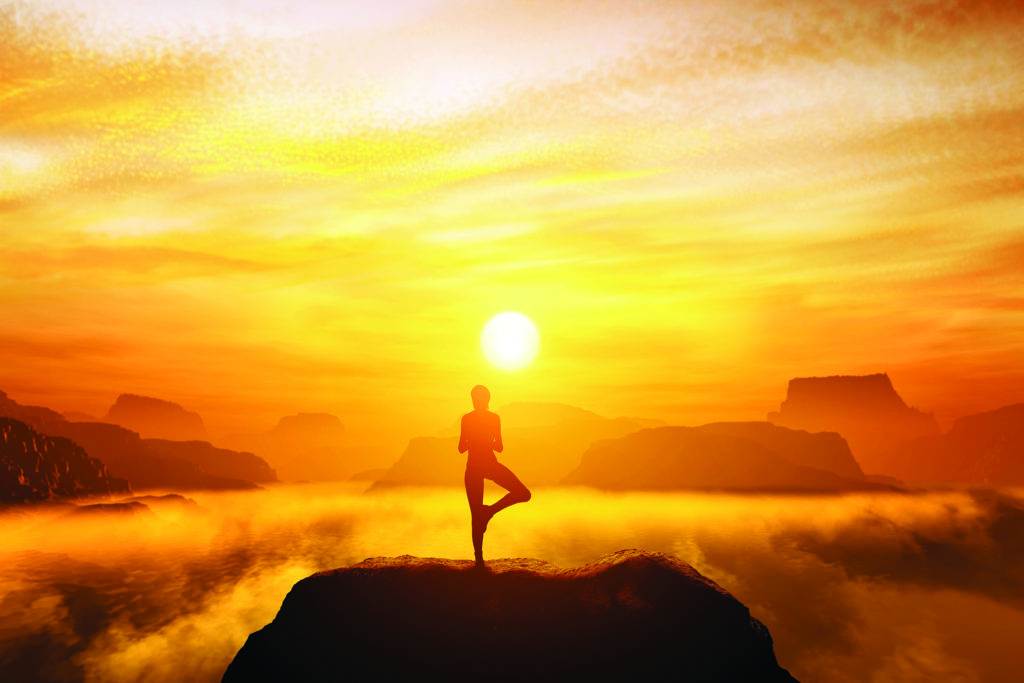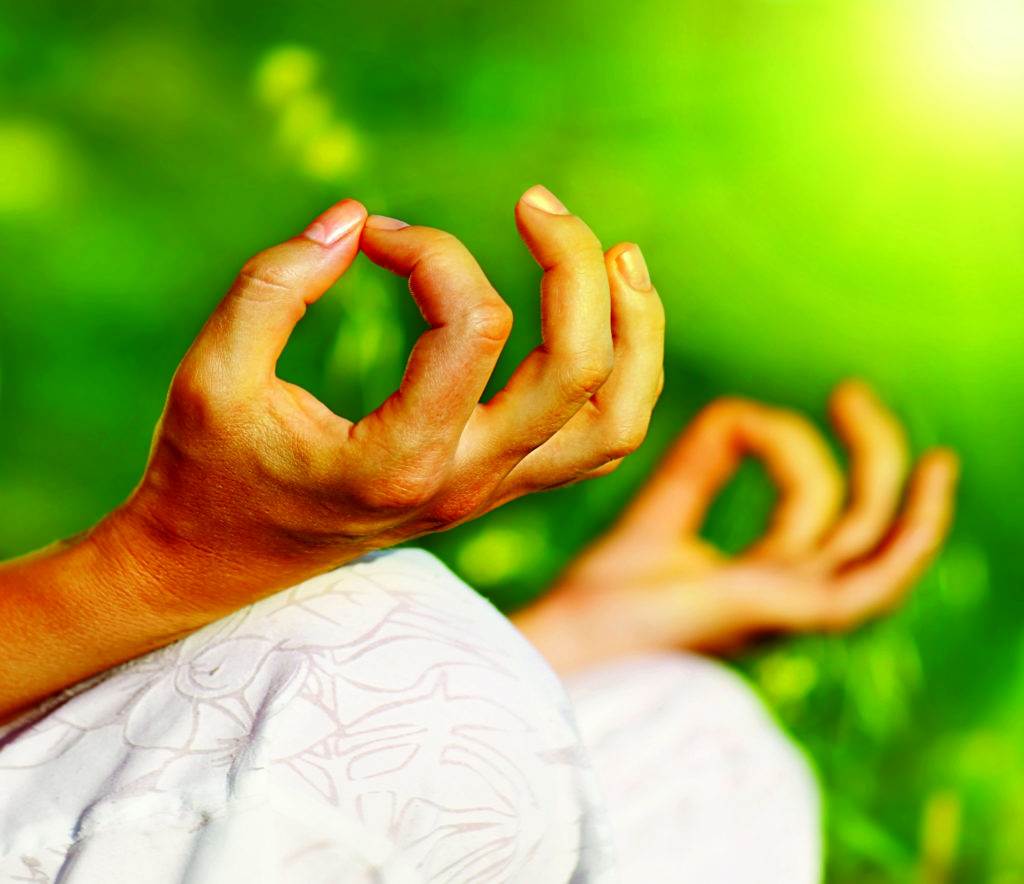An Initiative of the Black
Yoga Teachers Alliance
BY MAYA BREUER
A yoga curriculum based on contemplative practices, developed to help individuals, families, and communities survive the aftermath of violence
Today violence is epidemic, and it is considered a major public health issue. Within the United States the myriad types of violence include acts committed by police, gangs, and domestic partners, and local acts of terror. Although many have tried to introduce approaches to stop the violence, this macabre phenomenon still plagues us.
Violence impacts the body, mind, and spirit of the individual and the community. Its effects can cause severe trauma to those who have experienced it, witnessed it, or live in fear of it. Trauma from the aftermath of violence can lead to chronic ailments such as heart disease, stroke, and mental health issues such as depression, PTSD, stress, and anxiety, as well as other unknown physical and psychological problems. Many in the medical and scientific community view violence as a contagious disease. In 2013, the National Academy of Sciences published a 153-page report titled The Contagion of Violence, saying that “violence is like a contagious disease that spreads from person to person.”
In 2009, my friend and colleague Jana Long and I put our heads and hearts together and decided to create the Black Yoga Teachers Alliance (BYTA), a 501(c)3 nonprofit organization. After the creation of BYTA and the horrendous murder and death of Travon Martin in 2012, we began discussing violence in our communities, violence in America. Over time our conversation brought us to considering how the newly formed BYTA community could use yoga to change the impact of violence on individuals and communities. We talked about how violence impacted all cultures and communities, but still the epidemic of violence continues to grow within black communities in the US. Our conversations always came back to the same questions: How do people and communities return to normalcy after violence? Could the individual and community thrive again? What was there to help?

What emerged was the realization that after the loss of a loved one, after a brutal domestic violence assault, after a rape or other violent act, there was nothing readily available for those impacted—no website offering such as “What to do while living in the aftermath of violence in your community.” There were no methodologies, no practices, no steps to take to rejuvenate, no community consciousness raising, no balm to soothe and keep one going—there was nothing being offered to those living on after the assault of violence, after the loss of a child, brother, or sister to gun violence, after the community mourning of a tragedy—nothing being taught to help one survive life in the aftermath of violence. There was nothing!
We grappled with this, and in an ah-ha moment realized that we were yogis and we knew practices and perspectives to renew one’s life and spirit.
All of these terse and poignant conversations led me to reflect on my own experiences with violence and the aftermath, which negatively impacted my life. My first experience was the untimely death of my younger sister, Sherry Lynn, many years ago. She was 20 years old and she took her own life in an extremely violent manner. After her death, my soul and spirit were shaken. Sure, I returned to my corporate job and took care of my three children, but I found it difficult to find peace or to have any joy within myself. In my family, silence was the rule. We did not speak or acknowledge our feelings, and we did not talk about what had happened. This silence was the route my family collectively took; it was as if my sister had just disappeared. I adopted this family norm and went on bruised and silent for years, struggling and seeking solace in things that were not good for my spirit.
A decade later, just as I was beginning to discover and practice yoga, my younger brother Peter was diagnosed with AIDS. I became his main support and caregiver. He died after a two-year battle and that loss was then heaped atop the violence and loss of my sister. I carried on in silence, as was our way—the norm.
I recall times when I could barely breathe, but after a few months of intense grief and despair I began to resume my life and seek relief, but the relief that I sought did not nourish me. I found myself moving through life in a haze, unable to go forward, unable to go back, and compromising any ability to heal and renew because of the unhealthy behaviors that I had chosen: alcohol abuse, bad food, and poor choices led to a sleeplessness that plagued me. I was stuck in the aftermath of violence living in pain, sorrow, and confusion.

The same year that my brother died, I was finally able to resume my yoga study and practice. A few years after his death, I traveled to India and there I dove headlong into the study of contemplative yoga practice and philosophy. It was this knowledge and awareness that finally supported me as I began to peel back the layers of pain and sorrow that had clouded my existence. Yoga became a boon to my health and well-being. Through the study and practice of hatha yoga, meditation, and the intense exploration of yoga philosophy, I began to regain my footing in life. I began to release the pain that had stifled my spirit.
As yogis living the yogic lifestyle, both Jana and I have been privy to the far-flung contemplative practices within cultural and traditional yoga. They are found in the Yoga Sutras, codified by Sage Patanjali, in the sacred readings and contemplations of the Upanishads, in Ashtanga yoga or the eight limbs of yoga, and in the practice of breathing and meditation. Yoga As A Peace Practice was born!
Yoga As A Peace Practice (YPP) is not a typical hatha yoga class where the emphasis is on movement and breathing. YPP provides a “contemplative self-help intervention to address the impact of trauma for individuals and communities where there is dysfunction, violence, or chaos.” This contemplative approach to yoga may illuminate new ideas and ways of being in our hearts and minds. It is not a panacea for all the troubles (or violence) in the world. Yet it is a powerful catalyst for people who desire to shift their thinking and path in life, to help people renew themselves and create new ways of being.
In May, we offered the first pilot of YPP at Impact Hub Oakland. This event was funded by the Urban Family Foundation, and we were pleased to have Master Yogi Mark Whitwell join us to offer his Heart of Yoga practice and satsang to participants. Our second YPP training was held in July at the Kripalu Center for Yoga and Health. One of the most significant things learned from both events is that many who seek the training to offer to others are themselves victims of violence and loss.
At each of the YPP trainings we welcome everyone impacted by violence. There is no preference or concern about race, creed, color, religion, sexual orientation, or gender identity. All are welcome. We offer the YPP curriculum to yoga teachers, community activists, and community leaders; mothers, fathers, and children who have lost family members and friends to gun violence; psychiatrists, psychologists, and social workers; classroom teachers and educators; police, etc. This curriculum teaches one how to cope individually, and it has also been developed to be integrated into share circles, prayer circles, bible study groups, counseling sessions, community meetings, discussion groups, and most importantly, into yoga classes.
Our hope is to spread this initiative throughout the US, to cities where folk particularly need these teachings. At present those cities are Baltimore, Brooklyn, Charlotte, Chicago, Dallas, and Detroit—and there will be others. We invite you to join us to be part of the remedy by hosting YPP training in your community or by participating in one of the future trainings offered. All are welcome! Information about how to host a YPP training in your community is available at BlackYogaTeachersAlliance.org.
Celebrated as one of America’s distinguished black yogis by Black Enterprise magazine, Maya Breuer is a preeminent yoga instructor and practitioner, author, community activist, and consultant with a career spanning over three decades. She is president and cofounder of the Black Yoga Teachers Alliance and founder of the Santosha School of Yoga. MayaBreuer.com